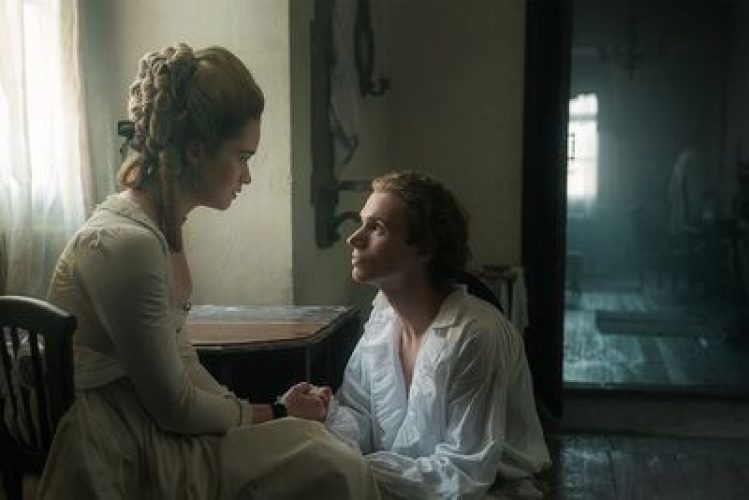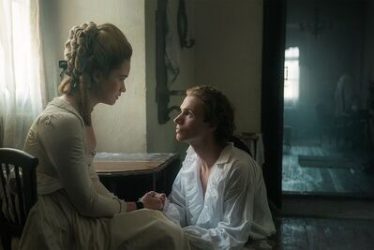With “Dangerous Liaisons,” Starz continues its doubling or tripling down on the bawdy, “Bridgerton”-y period costume dramas it’s made its stock in trade over the last few years. And for what it’s worth, the source material seems prime fodder for the network’s penchant for slightly modernized, bodice-ripping tales of powerful women surviving in worlds of class stratification and snooty menfolk.
First a 1782 novel by Pierre Choderlos de Laclos, then a stage play, then a boatload of adaptations (including a stellar 1988 adaptation starring Glenn Close and John Malkovich, and, well, “Cruel Intentions”), “Dangerous Liaisons” uses its 18th-century French backdrop to soak us in the dastardly deeds of two people who used to love each other, but now don’t, and would rather use that energy to help each other ruin those younger and more in love than they.
But curiously, rather than try a more direct adaptation, creator Harriet Warner spins the central characters of the book into a dull, plodding prequel that simultaneously apes the camp appeal of the 1988 film while also stretching it into a dour tale of destiny and conspiracy.
Where Close played the scheming Marquise de Merteuil in Frears’ 1988 take, here we have Alice Englert as the young Camille. Rather than a lifelong member of nobility, Warner’s version of the character positions her as an impoverished sex worker who lucks into the class-hopping con of a lifetime. You see, her lover, the rakish Valmont (Nicholas Denton, pouty and peevish), has been sleeping with wealthy married women all over Paris, keeping trinkets and letters to keep them quiet and his position secure. One of these marks is the current Marquise de Merteuil (an incredible, wily Lesley Manville), who sees something in the young woman after Camille confronts her. Maybe it’s her moxie, maybe it’s the potential to carry on her own legacy. But before Camille knows it, the current madame has taken her in as her unlikely ward, and the girl is lifted from poverty into the upper echelons of French culture.
From here, “Liaisons” takes on a roughly episodic nature, as Camille navigates this new world she’s been thrust into, with the hoi polloi of Parisian high society circling around her like vultures, wondering just how this young girl got here so suddenly. Lucky for her, she’s just as resourceful in youth as she will be in middle age, and the show occasionally delights in demonstrating those wiles as she fends off one threat after another to her standing.
Sometimes, but not always, this involves crossing paths with Valmont—the two circling around each other, serving as mortal enemies and reluctant allies depending on the adventure that faces them that episode. The show’s most effective moments come from this coupling, due in no small part to Englert and Denton’s sizzling chemistry. Whether sniping at each other or ripping their clothes off, it’s a welcome sight.
The show around them, unfortunately, vacillates between convoluted and dull as dishwater. While the first episode is buoyed by Manville’s icy, jaded presence, offering a glimmer of the jaundiced schemers for which the original story is known, there’s a notable lack of momentum in the rest of the season. Characters surrounding our leads feel like vague wisps of insinuation rather than human beings, a sea of (largely white) gossips and haughty Frenchmen whose various connections it’d take a diagram to keep straight. It’s occasionally fun to see Camille best these society figures until you realize you don’t quite remember who it is she’s beaten or why.
The script is as murky as its cinematography, which flits from smart evocations of “Barry Lyndon” (right down to some very familiar tableaus) to an orange-hued drabness that sucks the color out of otherwise handsome costumery and makeup work. Occasionally, the show looks fantastic, and kudos to them for picking a consistent mood. I just wish it didn’t require so much squinting through the pea-soup-thick fog and dim candlelight to see what’s going on. The muck even invades the show’s multiple sex scenes, robbing them of some of their tawdry appeal (though some images, like a carriage rocking in the middle of a busy Paris street, are campy fun).
There’s something to be said for attempting a version of “Dangerous Liaisons” with younger, less corrupted versions of our main characters. After all, the chief appeal of the story is relishing in a love story where the two lovers are less interested in celebrating their own romance than in demolishing the romance of others. Why not explore what made them this way?
Trouble is, the answers Warner gives us feel too cliched, too borne in over-the-top tragedy (spurned father figures, assault, attempted suicide). Here, their games of one-upsmanship root themselves in a kind of righteous revenge against the oppressive caste systems of pre-revolution France. They’re not reflections of the depravity of privilege, but underdog girlbosses and brooding sadbois we’re meant to root for. Manville’s Genevieve calls on Camille to “avenge [their] sex,” chucking the amorality of the original work in favor of a kind of us-against-the-world crusade, peppered with a few dashes of skin. But for a show that relishes in the odd bit of historical boinking, the rest of it feels disappointingly flaccid.
Starz has already greenlit “Liaisons” for a second season before its first has even aired; hopefully, that gives it the room to find its footing and restore the black heart that made its source material such devilish fun to absorb.
First season screened for review.
With “Dangerous Liaisons,” Starz continues its doubling or tripling down on the bawdy, “Bridgerton”-y period costume dramas it’s made its stock in trade over the last few years. And for what it’s worth, the source material seems prime fodder for the network’s penchant for slightly modernized, bodice-ripping tales of powerful women surviving in worlds of class stratification and snooty menfolk. First a 1782 novel by Pierre Choderlos de Laclos, then a stage play, then a boatload of adaptations (including a stellar 1988 adaptation starring Glenn Close and John Malkovich, and, well, “Cruel Intentions”), “Dangerous Liaisons” uses its 18th-century French backdrop to soak us in the dastardly deeds of two people who used to love each other, but now don’t, and would rather use that energy to help each other ruin those younger and more in love than they. But curiously, rather than try a more direct adaptation, creator Harriet Warner spins the central characters of the book into a dull, plodding prequel that simultaneously apes the camp appeal of the 1988 film while also stretching it into a dour tale of destiny and conspiracy. Where Close played the scheming Marquise de Merteuil in Frears’ 1988 take, here we have Alice Englert as the young Camille. Rather than a lifelong member of nobility, Warner’s version of the character positions her as an impoverished sex worker who lucks into the class-hopping con of a lifetime. You see, her lover, the rakish Valmont (Nicholas Denton, pouty and peevish), has been sleeping with wealthy married women all over Paris, keeping trinkets and letters to keep them quiet and his position secure. One of these marks is the current Marquise de Merteuil (an incredible, wily Lesley Manville), who sees something in the young woman after Camille confronts her. Maybe it’s her moxie, maybe it’s the potential to carry on her own legacy. But before Camille knows it, the current madame has taken her in as her unlikely ward, and the girl is lifted from poverty into the upper echelons of French culture. From here, “Liaisons” takes on a roughly episodic nature, as Camille navigates this new world she’s been thrust into, with the hoi polloi of Parisian high society circling around her like vultures, wondering just how this young girl got here so suddenly. Lucky for her, she’s just as resourceful in youth as she will be in middle age, and the show occasionally delights in demonstrating those wiles as she fends off one threat after another to her standing. Sometimes, but not always, this involves crossing paths with Valmont—the two circling around each other, serving as mortal enemies and reluctant allies depending on the adventure that faces them that episode. The show’s most effective moments come from this coupling, due in no small part to Englert and Denton’s sizzling chemistry. Whether sniping at each other or ripping their clothes off, it’s a welcome sight. The show around them, unfortunately, vacillates between convoluted and dull as dishwater. While the first episode is buoyed by Manville’s icy, jaded presence, offering a glimmer of the jaundiced schemers for which the original story is known, there’s a notable lack of momentum in the rest of the season. Characters surrounding our leads feel like vague wisps of insinuation rather than human beings, a sea of (largely white) gossips and haughty Frenchmen whose various connections it’d take a diagram to keep straight. It’s occasionally fun to see Camille best these society figures until you realize you don’t quite remember who it is she’s beaten or why. The script is as murky as its cinematography, which flits from smart evocations of “Barry Lyndon” (right down to some very familiar tableaus) to an orange-hued drabness that sucks the color out of otherwise handsome costumery and makeup work. Occasionally, the show looks fantastic, and kudos to them for picking a consistent mood. I just wish it didn’t require so much squinting through the pea-soup-thick fog and dim candlelight to see what’s going on. The muck even invades the show’s multiple sex scenes, robbing them of some of their tawdry appeal (though some images, like a carriage rocking in the middle of a busy Paris street, are campy fun). There’s something to be said for attempting a version of “Dangerous Liaisons” with younger, less corrupted versions of our main characters. After all, the chief appeal of the story is relishing in a love story where the two lovers are less interested in celebrating their own romance than in demolishing the romance of others. Why not explore what made them this way? Trouble is, the answers Warner gives us feel too cliched, too borne in over-the-top tragedy (spurned father figures, assault, attempted suicide). Here, their games of one-upsmanship root themselves in a kind of righteous revenge against the oppressive caste systems of pre-revolution France. They’re not reflections of the depravity of privilege, but underdog girlbosses and brooding sadbois we’re meant to root for. Manville’s Genevieve calls on Camille to “avenge [their] sex,” chucking the amorality of the original work in favor of a kind of us-against-the-world crusade, peppered with a few dashes of skin. But for a show that relishes in the odd bit of historical boinking, the rest of it feels disappointingly flaccid. Starz has already greenlit “Liaisons” for a second season before its first has even aired; hopefully, that gives it the room to find its footing and restore the black heart that made its source material such devilish fun to absorb.First season screened for review. Read More


